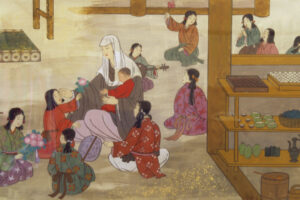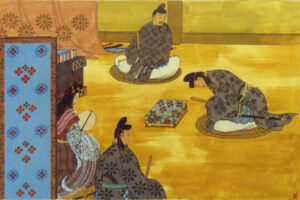The Dōkyō Incident, Part I – The Oracle and the Imperial Envoy
道鏡事件前篇 ― 神託と勅使
In 769, Wake no Kiyomaro stood before Empress Shōtoku and the court, carrying the oracle of Usa Hachiman. With unwavering resolve, he declared that the throne must remain with the imperial line and not be seized by the monk Dōkyō. His courage in this moment marked a turning point in Japanese history.

A painting of Wake no Kiyomaro kneeling before Empress Shōtoku and the court, presenting the oracle of Usa Hachiman with solemn resolve. This scene depicts the historic confrontation with the monk Dōkyō’s ambition. (Source: Wake Shrine, 1385 Fujino, Wake Town, Okayama Prefecture, Japan – https://wake-jinjya.com/)
Introduction – A Nation in Spiritual Crisis
In the eighth century, Japan faced not only political turbulence but also a spiritual crisis. At the center stood the powerful monk Dōkyō, whose influence over Empress Shōtoku grew so immense that he sought to replace the imperial line itself. What unfolded became one of the most dramatic confrontations between political ambition and the sacred continuity of the throne.
The Oracle from Usa Hachiman
In 769, whispers of Dōkyō’s ambition spread through the court. To settle the matter, Empress Shōtoku sent an imperial envoy to the shrine of Usa Hachiman in Kyushu, seeking divine guidance. The oracle returned was shocking:
“If Dōkyō becomes emperor, the realm shall be at peace.”
This pronouncement seemed to confirm Dōkyō’s claim to power. Yet the words also carried danger. To enthrone a monk, outside the imperial lineage, would overturn the very foundations of Japan’s polity—what the Nihon Shoki had enshrined as the sacred descent of the emperors.
The Emperor’s Treasure – The People
It was in this moment of peril that Wake no Kiyomaro was chosen as imperial envoy to Usa Hachiman. Unlike his predecessors, he carried not only ritual authority but also unshakable resolve. Arriving at the shrine, he prayed sincerely for guidance that would preserve the realm.
The new oracle was clear and direct:
“The imperial line is the emperor’s great treasure. A monk cannot reign. Dōkyō must not be made emperor.”
This divine message reversed the earlier declaration. It affirmed the principle that the people—the ōmikura, the great storehouse of the emperor—must be governed by a sovereign of unbroken descent.
The Return to Nara
Kiyomaro returned to the capital with the oracle, fully aware of the risk. To present such words meant opposing Dōkyō, who commanded both the empress’s trust and the power of the Buddhist establishment. Yet Kiyomaro did not waver. He delivered the oracle faithfully, declaring that imperial legitimacy could not be supplanted by clerical ambition.
This act of courage placed him directly in the crosshairs of Dōkyō’s wrath—and set the stage for exile, suffering, and ultimately vindication.
Conclusion – When Faith Meets Politics
The first act of the Dōkyō incident shows us how fragile governance can become when religious authority and political ambition intertwine. Yet it also reveals the strength of individuals like Kiyomaro, who risked everything to defend the sacred principle of imperial continuity.
In the next part, we will see the consequences: Dōkyō’s retaliation, Kiyomaro’s exile, and the enduring lesson that authority, when severed from legitimacy, brings ruin rather than peace.


